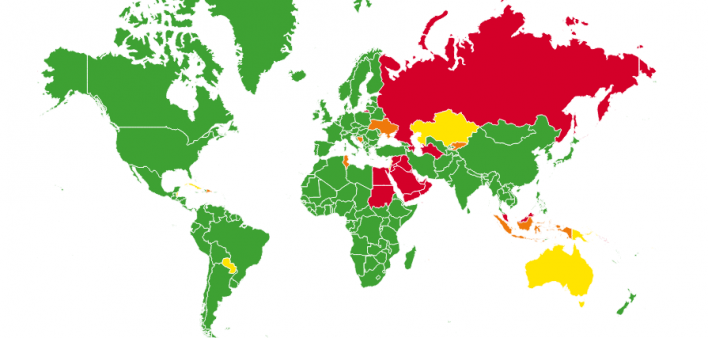New Zealand has lifted all travel restrictions on people living with HIV, which means they can apply for a visa to work and live in the country. Previously, Immigration New Zealand deemed that HIV-positive applicants did not meet an acceptable standard of health and were “likely to impose significant costs or demands” on health services, reports Stuff, a New Zealand publication. That is no longer the case.
Winnie Byanyima, the executive director of the Joint United Nations Programme on HIV/AIDS (UNAIDS), applauded the news. “I commend New Zealand for taking this important step and hope that it will encourage other countries to remove all travel restrictions and other policies that discriminate against people living with HIV,” she said in a UNAIDS statement.
According to Stuff, in the past five years, Immigration New Zealand received four resident visa applications and 10 temporary work visa applications from people living with HIV. Eight were approved.
An Argentine man living with HIV in New Zealand made headlines earlier this year when he lost an appeal against deportation. He had been living in the country with his husband, a New Zealander, and argued in his appeal that he might not be able to access his lifesaving meds in Argentina.
An immigration officer told Stuff that under the new guidelines, visa applicants would be assessed on a case-by-case basis and that HIV was no longer a disqualifying condition. HIV testing would still be required of applicants planning to stay in the country more than a year.
New Zealand, located in the southwestern Pacific Ocean just east of Australia, has a population of about 5.1 million. It consists of two main islands and over 700 smaller ones.
The United States did not officially lift its ban on HIV-positive foreigners entering the country until January 4, 2010. The ban had been in place for 22 years. Former President George W. Bush signed a law in July 2008 to lift the ban, but the new regulation wasn’t enacted until 2010, under President Barack Obama.
UNAIDS welcomes the announcement by New Zealand that it has removed all travel restrictions for people living with #HIV.
— UNAIDS (@UNAIDS) October 25, 2021
46 countries continue to impose some form of restriction on the entry, stay and residence of people living with HIV. ???? More https://t.co/onUTfGnVSS
UNAIDS notes that 46 countries, territories and areas still enforce some types of restrictions on the entry, travel and residence of people living with HIV. In a 2019 press release, UNAIDS listed the following countries and territories as having some form of HIV travel restrictions (obviously, New Zealand no longer belongs on the list):
Angola, Aruba, Australia, Azerbaijan, Bahrain, Belize, Bosnia and Herzegovina, Brunei Darussalam, Cayman Islands, Cook Islands, Cuba, Dominican Republic, Egypt, Indonesia, Iraq, Israel, Jordan, Kazakhstan, Kuwait, Kyrgyzstan, Lebanon, Malaysia, Maldives, Marshall Islands, Mauritius, New Zealand, Oman, Palau, Papua New Guinea, Paraguay, Qatar, Russian Federation, Saint Kitts and Nevis, Samoa, Saudi Arabia, Saint Vincent and the Grenadines, Singapore, Solomon Islands, Sudan, Syrian Arab Republic, Tonga, Tunisia, Turkmenistan, Turks and Caicos, Tuvalu, Ukraine, United Arab Emirates and Yemen.







3 Comments
3 Comments